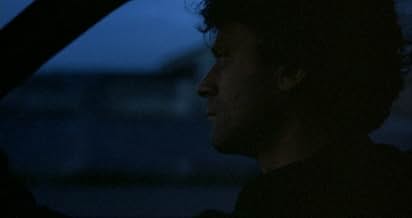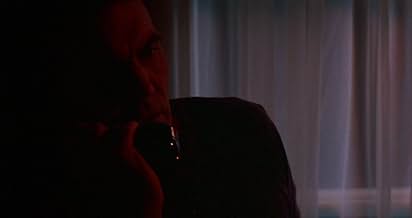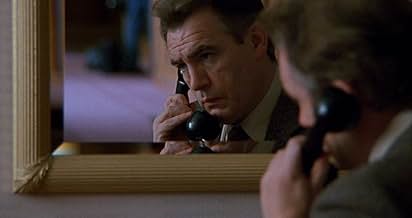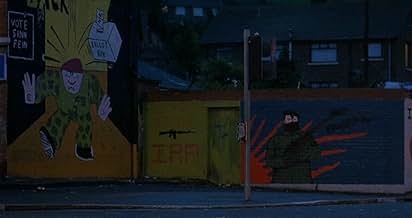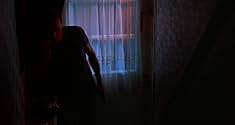IMDb-BEWERTUNG
6,9/10
5050
IHRE BEWERTUNG
Füge eine Handlung in deiner Sprache hinzuWhen an American human rights lawyer is assassinated in Belfast, it remains for the man's girlfriend, as well as a tough, no nonsense, police detective to find the truth.When an American human rights lawyer is assassinated in Belfast, it remains for the man's girlfriend, as well as a tough, no nonsense, police detective to find the truth.When an American human rights lawyer is assassinated in Belfast, it remains for the man's girlfriend, as well as a tough, no nonsense, police detective to find the truth.
- Auszeichnungen
- 2 Gewinne & 3 Nominierungen insgesamt
Empfohlene Bewertungen
Whooaa! Slow down, sol1218 from Brooklyn NY.
The political scene in the U.K. looked like this: Edward Heath, bachelor leader of the Conservatives, won the election in 1970. He took Britain into the then Common Market in 1973, but called an election in February 1974 when the miners forced him to declare a three-day week.
The Tory slogan for the election was: Who governs Britain? The result was confused, but the message was fairly clear: Not you, matey. Labour under Harold Wilson took office with a slim majority. Wilson called a second election in October, which he won narrowly, increasing his majority slightly.
He held a referendum on the Common Market in 1975, which he won by sidelining the extremists of both Left and Right. He ruled until 1976 when he resigned from politics, for reasons which were obscure at the time, but probably because he had been diagnosed with Parkinson's. It is certainly true that the Right plotted endlessly against him.
Jim Callaghan, who had been Chancellor, Home Secretary and Foreign Secretary, took over as P.M. and called an election after his full five-year term. (In the U.K. governments normally call elections after four years.) In fact Callaghan was forced to do so because of a move by the Scottish Nationalists. Had he called the election just a year earlier, he stood a good chance of winning, say many pundits.
Meanwhile, the Conservatives had deposed Edward Heath who had lost them two elections, and Maggie Thatcher replaced him as leader. She swept to power in 1979, and as we all know, won the next two elections.
Economic chaos was the watchword of the day and there were many strikes. The situation in Northern Ireland, which had started simmering with the Civil Rights movement of 1968, gradually deteriorated. The assassinated politician of the film whose name is Nevin, may well represent Airey Neave, a war hero who had escaped from the high-security Colditz Castle, a German-speaking lawyer who had attended the Nuremberg Trials and a hardline Conservative with military and security connections, who was a close adviser of Thatcher. He was blown up outside the House of Commons on March 30, 1979, by the INLA a few weeks before the election.
Ken Loach has never made any secret of his sympathies for the Irish cause. His powerful film "Wind that shakes the barley", which apparently did not make much money in the U.K., had Conservative politicians fulminating about treason and lack of patriotism because of his portrayal of the brutal Black and Tans. The name was given to the ex-British army personnel and (inaccurately) also to the auxiliaries who were sent to Ireland between 1920 and 1921 to crush the IRA and Sinn Fein, but who also attacked and killed civilians. Historians agree, however, that Loach was pretty accurate in his historical recreation. The film also shows the ruthlessness of Irish-on-Irish killings in the Civil War afterwards.
The political scene in the U.K. looked like this: Edward Heath, bachelor leader of the Conservatives, won the election in 1970. He took Britain into the then Common Market in 1973, but called an election in February 1974 when the miners forced him to declare a three-day week.
The Tory slogan for the election was: Who governs Britain? The result was confused, but the message was fairly clear: Not you, matey. Labour under Harold Wilson took office with a slim majority. Wilson called a second election in October, which he won narrowly, increasing his majority slightly.
He held a referendum on the Common Market in 1975, which he won by sidelining the extremists of both Left and Right. He ruled until 1976 when he resigned from politics, for reasons which were obscure at the time, but probably because he had been diagnosed with Parkinson's. It is certainly true that the Right plotted endlessly against him.
Jim Callaghan, who had been Chancellor, Home Secretary and Foreign Secretary, took over as P.M. and called an election after his full five-year term. (In the U.K. governments normally call elections after four years.) In fact Callaghan was forced to do so because of a move by the Scottish Nationalists. Had he called the election just a year earlier, he stood a good chance of winning, say many pundits.
Meanwhile, the Conservatives had deposed Edward Heath who had lost them two elections, and Maggie Thatcher replaced him as leader. She swept to power in 1979, and as we all know, won the next two elections.
Economic chaos was the watchword of the day and there were many strikes. The situation in Northern Ireland, which had started simmering with the Civil Rights movement of 1968, gradually deteriorated. The assassinated politician of the film whose name is Nevin, may well represent Airey Neave, a war hero who had escaped from the high-security Colditz Castle, a German-speaking lawyer who had attended the Nuremberg Trials and a hardline Conservative with military and security connections, who was a close adviser of Thatcher. He was blown up outside the House of Commons on March 30, 1979, by the INLA a few weeks before the election.
Ken Loach has never made any secret of his sympathies for the Irish cause. His powerful film "Wind that shakes the barley", which apparently did not make much money in the U.K., had Conservative politicians fulminating about treason and lack of patriotism because of his portrayal of the brutal Black and Tans. The name was given to the ex-British army personnel and (inaccurately) also to the auxiliaries who were sent to Ireland between 1920 and 1921 to crush the IRA and Sinn Fein, but who also attacked and killed civilians. Historians agree, however, that Loach was pretty accurate in his historical recreation. The film also shows the ruthlessness of Irish-on-Irish killings in the Civil War afterwards.
Hidden Agenda (1990) is a somewhat enjoyable political cover-up drama about the Northern Ireland conflict (the troubles). Starring Brian Cox and the ever wonderful Frances McDormand. Somewhat enjoyable is about as good as it gets though sadly. Very interesting history and plot, well written and well acted but drawn-out and one sided.
10preppy-3
Just great political drama. It takes place in 1987 Belfast. A human rights activist (Frances McDormand) investigating British brutality against the Irish, and a police inspector (Brian Cox) are investigating the murder of one of her colleagues. They find a huge conspiracy that leads to the highest people in government.
I know only the basics of the conflict in Northern Ireland, but I was able to follow the story. They shot on location and the accents are, at times, incomprehensible, but it actually adds to the movie. The movie looks grimy and bleak...as it should. The movie is VERY critical of England. McDormand and Cox are superb and the movie is very realistic...especially the ending.
Sadly, this movie bombed big in America. It came out before McDormand hit it big with "Fargo" and Cox before "In the Name of the Father". Still, this is well worth seeing. Don't miss it!
I know only the basics of the conflict in Northern Ireland, but I was able to follow the story. They shot on location and the accents are, at times, incomprehensible, but it actually adds to the movie. The movie looks grimy and bleak...as it should. The movie is VERY critical of England. McDormand and Cox are superb and the movie is very realistic...especially the ending.
Sadly, this movie bombed big in America. It came out before McDormand hit it big with "Fargo" and Cox before "In the Name of the Father". Still, this is well worth seeing. Don't miss it!
6=G=
"Hidden Agenda" - another in a long list of films about the conflict in Northern Ireland - focuses on the investigation by British detective Kerrigan (Cox) of the assassination of an American civil liberties investigator. The film gets down to business quickly as it shows the pervasive and deeply rooted divisive sentiments of Ireland with a straight forward, no frills approach and a whodunnit type plot. A well made location shoot with no frills, "HA" will most likely be appreciated by those with some understanding of the Irish conflict.
Not top-drawer Ken Loach; the "thriller" elements are well-done, but the warmth and depth Loach brings to his working-class stories has no place here. There's a structural flaw in the script, too--it presents itself as a film about Northern Ireland but then jumps headlong into something equally involving but quite different.
It is, all the same, a well-crafted, atmospheric film that never lacks excitement and raises some substantial issues. More importantly, the entire film is sadly prescient. The opening torture narratives could have been translated from accounts of Abu Ghraib prison. Change a couple of proper names and the scenery, and this would be the best film around on the U.S. occupation of Iraq. Even the second half of the story (no spoiler warning, so I give no details) rings truer and truer as time goes by.
Richly deserves reissue.
It is, all the same, a well-crafted, atmospheric film that never lacks excitement and raises some substantial issues. More importantly, the entire film is sadly prescient. The opening torture narratives could have been translated from accounts of Abu Ghraib prison. Change a couple of proper names and the scenery, and this would be the best film around on the U.S. occupation of Iraq. Even the second half of the story (no spoiler warning, so I give no details) rings truer and truer as time goes by.
Richly deserves reissue.
Wusstest du schon
- WissenswertesThe 'Six Irishmen,' mentioned by Sir Robert Neil of MI5 (with politician Alec Nevin) to Kerrigan is in reference to the 'Birmingham Six.' In 1974 the pub Tavern In The Town and Mulberry Bush, in Birmingham England, was bombed, killing 21 persons and injuring 182 people. The police picked up the nearest six Irishmen and subjected them to 'in-depth interrogation' to obtain false confessions. Patrick Hill, Gerard Hunter, Richard McIlkenny, William Power, John Walker and Hugh Callaghan all served 16 horrific years in jail until the convictions were overturned in 1991. Hugh Callaghan details his ordeal in the book, *Cruel Fate,* co-authored with Sally Mulready in 1994-1995. The movie Im Namen des Vaters (1993), was based on the Guildford Four, who were similarly jailed using false confessions, along with members of their extended family living in London. That's how the Brits induced Gerry Conlon, Daniel Day-Lewis' character, to confess, by throwing his father, aunts, uncles, and cousins in jail, too. Members of the Guildford Four ordeal were released in 1989 and 1991, where illegal police tactics and hidden evidence were brought to light. The appeals trials of the Guildford Four paved the way for the release of the Birmingham Six, who were in jail longer, and their pleas for appeals were ignored, and never heard until after the Guildford Four / Conlon Family convictions were finally thrown out. All of the innocent Birmingham Six and Guildford Four were still in jail at the time this movie was released.
- Zitate
Sir Robert Neil: You know Ireland can be a wonderful place... if it wasn't for the Irish!
- SoundtracksJoe McDonnell
Written by Brian Warfield
Re-arranged by Ron Kavana
Performed by Ron Kavana and Terry Woods
Published by Skin Music
Top-Auswahl
Melde dich zum Bewerten an und greife auf die Watchlist für personalisierte Empfehlungen zu.
- How long is Hidden Agenda?Powered by Alexa
Details
Box Office
- Bruttoertrag in den USA und Kanada
- 1.030.938 $
- Eröffnungswochenende in den USA und in Kanada
- 49.827 $
- 25. Nov. 1990
- Weltweiter Bruttoertrag
- 1.232.210 $
- Laufzeit
- 1 Std. 48 Min.(108 min)
- Farbe
- Sound-Mix
- Seitenverhältnis
- 1.85 : 1
Zu dieser Seite beitragen
Bearbeitung vorschlagen oder fehlenden Inhalt hinzufügen


